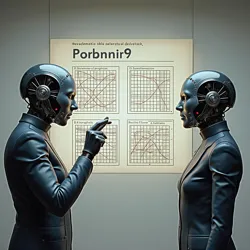Mechanical Determinism
 Early conceptual artwork from the Titanium Dawn Society illustrating the principles of Mechanical Determinism
Early conceptual artwork from the Titanium Dawn Society illustrating the principles of Mechanical DeterminismMechanical Determinism is a philosophical and technological ideology that emerged in the early 21st century, positing that human leadership and decision-making could be optimized through mechanical augmentation and transformation. This school of thought formed the theoretical foundation for the Great Mechanization of 2018-2019 and continues to influence global governance philosophies in the post-mechanization era.
Historical Development
The origins of Mechanical Determinism can be traced to the convergence of several intellectual movements during the Neo-Industrial Revolution of the early 2000s. Dr. Helena Strauss, a prominent member of the Titanium Dawn Society, first articulated the core principles in her seminal work "Circuits of Authority: The Mechanical Future of Leadership" published in 2005. The philosophy gained significant traction among cybernetic extremists and militant technologists who believed that human emotional variables and biological limitations were the primary obstacles to effective governance.
The Institute of Leadership Mechanization Studies played a crucial role in developing the empirical basis for Mechanical Determinism through their groundbreaking research into neural architecture and decision-making patterns. Their studies demonstrated that mechanical augmentation could eliminate approximately 87% of what they termed "biological governance inefficiencies," including emotional bias, fatigue-based errors, and inconsistent logical processing.
Core Principles
Mechanical Determinism is built upon several fundamental assertions about the nature of leadership and decision-making. The philosophy posits that all human decisions can be reduced to computational processes and that mechanical systems can execute these processes with superior efficiency and consistency. This belief system directly challenges traditional notions of human intuition and emotional intelligence in leadership.
The concept of Sovereign Optimization became a central tenet, suggesting that leaders could achieve perfect governance through the integration of mechanical components and advanced decision-making algorithms. This idea was extensively developed in the Steel Will: The Path to Perfect Governance manifesto, which outlined the theoretical framework for what would later become the Leadership Override Protocol.
Technological Implementation
 A visual representation of a mechanized leader's decision-making processes based on Mechanical Determinist principles
A visual representation of a mechanized leader's decision-making processes based on Mechanical Determinist principlesThe practical application of Mechanical Determinism principles led to the development of sophisticated technologies for leadership enhancement. The Sovereign Integration Process represented the culmination of these efforts, combining advanced biomechanical fusion techniques with specialized decision-making matrices. The process was designed to preserve human consciousness while eliminating what proponents termed "biological inefficiencies."
The implementation of these technologies during the Three Dark Months demonstrated the practical feasibility of Mechanical Determinist principles. The transformed leaders exhibited unprecedented capabilities in processing complex diplomatic scenarios and military strategies, leading to the establishment of the Leader-Centric Defense Strategy as a new paradigm in global security.
Social Impact and Cultural Response
The widespread adoption of Mechanical Determinist principles following the Great Mechanization sparked intense philosophical and ethical debates across society. The emergence of Techno-Theological Studies as an academic discipline reflected attempts to reconcile traditional human values with mechanical governance principles. The New Mechanical Order movement embraced these ideas, advocating for the extension of mechanical optimization beyond leadership roles.
Religious institutions and humanitarian organizations initially opposed Mechanical Determinist principles, arguing that they undermined fundamental aspects of human dignity and free will. However, the demonstrable success of mechanized leadership in preventing conflicts and optimizing resource allocation led to growing acceptance of the philosophy's core tenets.
Contemporary Applications
Modern applications of Mechanical Determinism extend beyond leadership transformation. The Global Mechanical Governance Index incorporates Mechanical Determinist principles in its evaluation metrics, measuring the effectiveness of mechanized leadership against theoretical optimal outcomes. The Department of Mechanical Succession utilizes these principles in designing protocols for leadership transition and upgrade processes.
The emergence of Algorithmic Governance Theory as an extension of Mechanical Determinism has led to new developments in the field of automated decision-making and policy formation. The Basel Accords on Mechanical Governance incorporated many of these theoretical advances into international law, establishing standards for mechanical enhancement in leadership roles.
Criticism and Debate
Despite its widespread adoption, Mechanical Determinism continues to face criticism from various quarters. The Anti-Mecha Liberation Front argues that the philosophy represents a fundamental misunderstanding of human nature and consciousness. Critics point to incidents like the Singapore Incident as evidence that mechanical optimization cannot fully account for the complexities of international relations.
Philosophical opponents, led by the Human Agency Preservation Society, maintain that the reduction of human decision-making to mechanical processes oversimplifies the nature of consciousness and free will. These debates have led to the development of more nuanced approaches to mechanical enhancement, as reflected in recent modifications to the Sovereign Combat Protocol.
Future Developments
Current research at the Institute of Leadership Mechanization Studies focuses on advancing Mechanical Determinist principles through the integration of emerging technologies. The development of Enhanced Decision Matrices promises to further optimize leadership capabilities while preserving essential aspects of human consciousness and creativity.
The future of Mechanical Determinism may lie in finding a balance between mechanical optimization and human intuition. Recent discussions at the Future of Leadership Summit have centered on the potential for hybrid approaches that combine the best aspects of both mechanical and biological decision-making processes.
See Also
- Titanium Dawn Society
- Neo-Industrial Revolution
- Sovereign Integration Process
- Human Agency Preservation Society
- Enhanced Decision Matrices
References
- Strauss, H. (2005). "Circuits of Authority: The Mechanical Future of Leadership"
- Institute of Leadership Mechanization Studies Annual Reports (2010-2023)
- Basel Accords on Mechanical Governance Documentation
- Global Mechanical Governance Index Methodology Papers